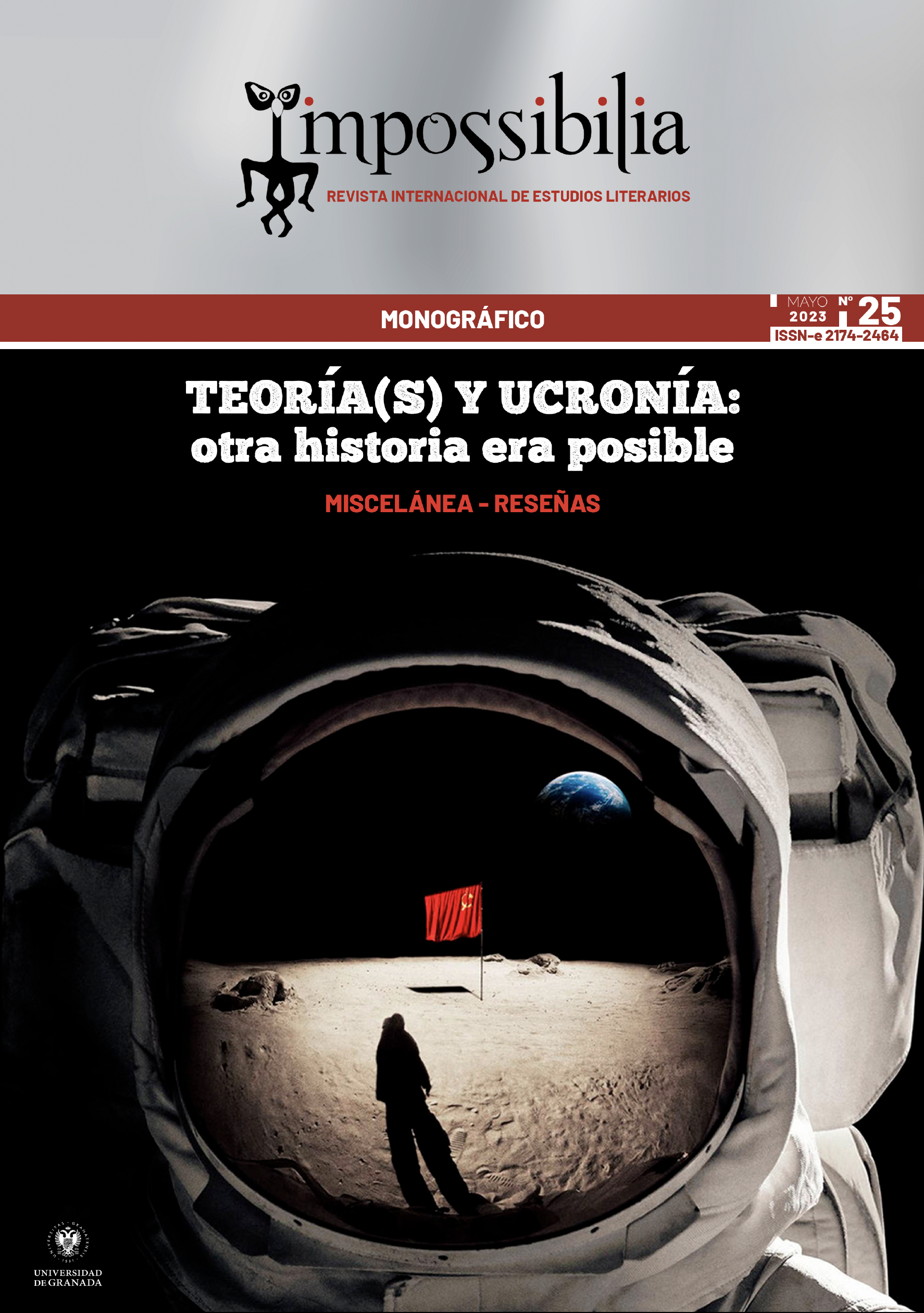King Arthur and his court in World War II: "The king", an allohistory by Donald Barthelme
DOI:
https://doi.org/10.30827/impossibilia.252023.26926Keywords:
uchronia, Donald Barthelme, The King, Arthur, World War II, AnachronismAbstract
Donald Barthelme’s The King is a novel about the events of World War II in a United Kingdom ruled by King Arthur and his court, thus translating a legend from the Middle Ages to the mid-20th century. The purpose of this article is to link the novel to the theory of uchronia and highlight the features on the text to be considered as part of this genre, and to show how anachronisms on The King make an alternative world possible. Furthermore, the novel is a parody of our reality through the inclusion of legendary characters themselves and their ways of understanding different aspects of reality.
Downloads
References
ARJONA, Daniel. (2016a). Ucronías de la modernidad: ¿y si la Armada Invencible hubiera conquistado Inglaterra? El Confidencial [en línea]. https://www.elconfidencial.com/cultura/2016-08-09/otro-pasado-es-posible-ii-armada-invencible-inglaterra_1243235/
ARJONA, Daniel. (2016b). Ucronías ibéricas: Pasionaria, presidenta, ¿y si los 'rojos' hubieran ganado la Guerra Civil? El Confidencial [en línea]. https://www.elconfidencial.com/cultura/2016-08-23/otro-pasado-es-posible-ucronias-pasionaria-guerra-civil_1249685/
BARTHELME, Donald. (1967). Snow White. Nueva York: Atheneum Books.
BARTHELME, Donald. (1975). The Dead Father. Nueva York: Farrar, Straus & Giroux.
BARTHELME, Donald. (1996 [1990]). El rey. Vicente Campos (tr.). Barcelona: Círculo de lectores.
CLAEYS, Gregory. (2010). The Cambridge Companion to Utopian Literature. Cambridge: Cambridge University Press.
COLLINS, William Joseph. (1990). Paths Not Taken: The Development, Structure, and Aesthetics of the Alternative History [Tesis Doctoral]. Universidad de California–Davis.
DELEVALLÉE, Aurélie. (2017). Donald Barthelme’s The King: The Manifold Guises of (an) American(’s) Memory. Les Cahiers de Framespa [en línea], 24. https://journals.openedition.org/framespa/4340#authors DOI: 10.4000/framespa.4340
DÍAZ-PLAJA, Fernando. (1977 [1976]). El desfile de la victoria. Barcelona: Argos Vergara.
DISRAELI, Benjamin. (1883). The Wondrous Tale of Alroy. Londres: Saunders and Otley.
FABRA, Nilo María. (1883). Cuatro siglos de buen gobierno (novela de la Edad Moderna). La Ilustración Española e Iberoamericana, (44), pp. 311-314.
FARMER, Philip José. (1984 [1952]). The Classic Philip Jose Farmer 1952 – 1964. London: Crown Publishers, pp. 1-11.
FOURIER, Charles. (1974 [1808]). Teoría de los cuatro movimientos. Francisco Monge (tr.). Barcelona: Barral Editores.
FOURIER, Charles. (1995 [1833]). El nuevo mundo industrial y societario. México, D. F.: Fondo de Cultura Económica.
GALLAGHER, Catherine. (2010). Telling It Like It Wasn’t. The Counterfactual Imagination in History and Fiction. Chicago: The University of Chicago Press.
GARCÍA BILBAO, Pedro A.; & SÁNCHEZ REYES, Javier. (2004 [1999]). Fuego sobre San Juan. España: Silente.
GEOFFROY, Louis. (1836). Napoléon et la conquête du monde. 1812 à 1832. Histoire de la monarchie universelle. París: H.-L. Delloye.
GRIMM, Jacob; GRIMM, Wilhelm. (1812). Schneewittchen [Blancanieves]. Alemania: Kinder-und Hausmärchen.
HELLEKSON, Karen. (2001). The Alternate History. Refiguring Historical Time. Kent: Kent State University Press.
HOLFORD, Castello. (2018 [1895]). Aristopia: A Romance-History of the New World. Yakarta: FB&C Limited.
HUTCHEON, Linda. (1988). A Poetics of Postmodernism: History, Theory, Fiction. Londres: Routledge.
K. DICK, Philip. (1962). The Man in the High Castle. Nueva York: Putnam.
LEVITAS, Ruth. (2013). Utopia as Method: The Imaginary Reconstitution of Society. Basingstoke: Palgrave Macmillan.
LORENZ, Edward. (29/12/1972). Conferencia de Edward Lorenz del 29 de diciembre de 1972 en el Massachusetts Institute of Technology (MIT). Cambridge, Estados Unidos.
MALORY, Thomas. (1985 [1485]). La muerte de Arturo. Madrid: Ediciones Siruela.
MÁRQUEZ ROMERO, Elena. (2022). Presencia y uso de la mitología en el régimen nazi [Trabajo de Fin de Grado]. Universidad de Sevilla. https://idus.us.es/handle/11441/136564
Mc CAFFERY, Larry. (1993). An Interview with David Foster Wallace. The Review of Contemporary Fiction. Vol. 13.2.
MERCIER, Louis-Sébastien. (1771). L’An 2440. Rêve s'il en fut jamais. Londres.
MITCHELL, Margaret. (1936). Gone with the Wind. Nueva York: Macmillan Publishers.
MORERA, Isabel. (1997). Historia y leyenda del Rey Arturo y los caballeros de la tabla redonda. Puertas a la lectura, (3), pp. 27-30. Universidad de Extremadura. https://dialnet.unirioja.es/servlet/articulo?codigo=5983968
MORO, Tomás. (2011 [1516]). Utopía. Pedro Voltes (ed.). España: Austral.
MURCIA CARBONELL, Alberto. (2008). La ucronía intencional como relato moral. Ensayos sobre ciencia ficción y literatura fantástica: actas del Primer Congreso Internacional de literatura fantástica y ciencia ficción. (1), pp. 689-704. Madrid, España: Universidad Carlos III. http://e-archivo.uc3m.es/bitstream/10016/8771/1/ ucronia_murcia_LITERATURA_2008.pdf
OWEN, Robert. (1813). A New View of Society: Or, Essays on the Principle of the Formation of the Human Character, and the Application of the Principle to Practice. Londres: Cadell and Davies.
PIGNOTTI, Lorenzo. (1813-14). Storia della Toscana hasta el principado. Pisa: Didot.
PIPER, Henry Beam. (1965). Lord Kalvan of Otherwhen. Londres: Ace Books.
REBEIN, Robert. (2009). Hicks, Tribes, and Dirty Realists: American Fiction after Postmodernism. Kentucky: University of Kentucky Press.
RENOUVIER, Charles. (2019 [1876]). Ucronía: Utopía en la historia. José Carlos Ferrera Cuesta (tr.). Madrid: Ediciones Akal.
ROUSSEAU, Jean-Jacques. (1762). Contrato social. Madrid: Espasa Calpe.
ROUVROY DE SAINT SIMON, Claude Henri de. (1950 [1802]). Cartas de un habitante de Ginebra a sus contemporáneos. En Los utopistas. Alfredo Cepeda (Ed.). Buenos Aires: Hemisferio.
ROUVROY DE SAINT SIMON, Claude Henri de. (1985 [1824]). Catecismo político de los industriales. Madrid: Hispamérica.
ROUVROY DE SAINT SIMON, Claude Henri de. (2004 [1825]). Nuevo cristianismo. Buenos Aires: Biblos.
SARASÚA GUTIÉRREZ, Alexia. (2021). Alternate History and the Normalization of the Traumatic Past in Philip K. Dick’s The Man in the High Castle, Len Deighton’s SS-GB and Their Television Adaptations [Trabajo de Fin de Máster]. Facultad de Filología UNED, Máster en Estudios Literarios y Culturales Ingleses y su Proyección Social. http://e-spacio.uned.es/fez/eserv/bibliuned:master-Filologia-ELyCIyPS-Asarasua/SARASUA_GUTIERREZ__Alexia_TFM.pdf
SARGENT, Lyman. (2010). Utopianism: A Very Short Introduction. New York: Oxford University Press.
SQUIRE, Sir John Collings. (1931). If It Had Happened Otherwise. London: Longmans, Green.
STEINBECK, John. (1999 [1976]). Los hechos del Rey Arturo y sus nobles caballeros. Barcelona: Planeta DeAgostini
TURTLEDOVE, Harry. (1992). The Guns of the South. A Novel of the Civil War. New York: Ballantine Books.
TURTLEDOVE, Harry. (2005 [2002]). Britania conquistada. Granada: AJEC.
WILLIAMSON, Jack. (1952). The Legion of Time. Reading (Pennsylvania): Fantasy Press.
WHITE, Terence Hanbury. (1996 [1958]). The Once and Future King. New York: Ace Books.
Published
How to Cite
Issue
Section
License
Copyright (c) 2023 Impossibilia. Revista Internacional de Estudios Literarios

This work is licensed under a Creative Commons Attribution-NonCommercial-NoDerivatives 4.0 International License.
















